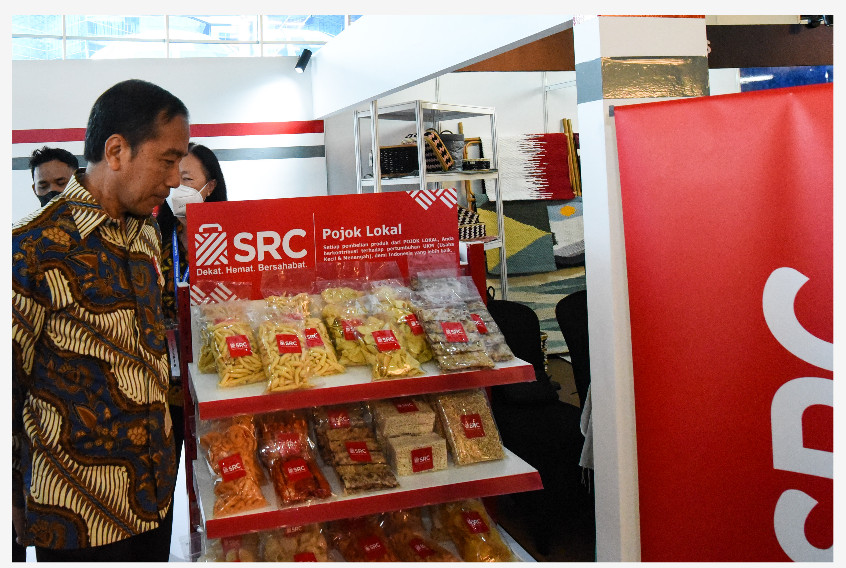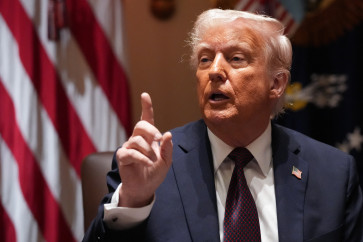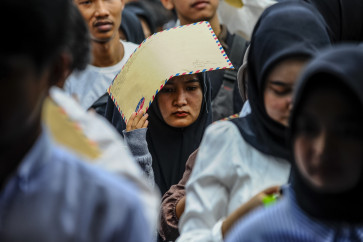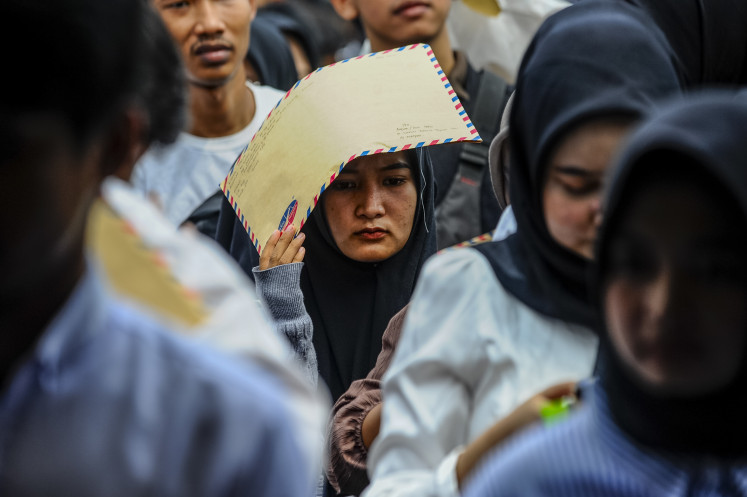MSMEs face uphill battle to improve exports
Support in terms of research and development, as well as access to information technology, will help MSMEs increase their competitiveness in export markets.
Change text size
Gift Premium Articles
to Anyone

M
icro, Small and Medium Enterprises (MSMEs) play a very important role in export activities that help increase Indonesia's Gross Domestic Product (GDP).
The pivotal responsibilities of MSME exporters include product diversification and innovation that create unique, regionally distinctive, and value-added products, thereby introducing local products that meet international market demands and preferences to help increase Indonesia's competitiveness in the global market. Additionally, these exporters should focus on job creation, which in turn will increase people's income and purchasing power, and the distribution of economic growth to particularly remote or marginalized areas, so as to open up new business opportunities, increase investment and expand market access for local products. The should also strive for economic empowerment and inclusion, especially for underserved groups of people, so that MSMEs can engage in international trade and access global markets to help improve economic welfare, reduce social inequality and create wider business opportunities. Furthermore, these exporters should increase added value and income by entering international markets to gain benefits from increased production scale, operational efficiency and increased product sales value.
There are several characteristics of MSME exporters. First, they are generally small to medium-size businesses with a limited number of employees and which usually have limited production and resources.
Second, the scope of MSME exporters is usually focused on products that are produced in a traditional or unique way, such as handicrafts, traditional textiles, locally processed foods and products typical of the region. These products often have cultural uniqueness and local added value.
Third, although the contribution to the total value of exports is relatively small, MSMEs have a significant economic impact at the local and regional levels.
Trade Ministry data shows MSME represent 77.28 percent of all exporters, with the remaining 22.72 percent being large-scale exporters. However, MSME exporters only contributed 4.1 percent to Indonesia's total exports, while 95.9 percent was contributed by large-scale exporters.
The government and other related institutions need to support MSMEs in export activities, such as financing, training, access to markets and information and assistance in meeting legal requirements and international trade regulations. By strengthening the role of MSMEs in export activities, Indonesia can encourage economic growth that is inclusive, sustainable and equitable throughout the country.
Developing MSMEs as the main export contributor to Indonesia's GDP is an ambitious goal, but can be achieved through strategic support.
First, the capacity of MSMEs should be strengthened in terms of management, production and marketing, through training, mentoring and access to the necessary resources, such as technology, capital and infrastructure. The government and related institutions can play a role in providing development programs that are tailored to the needs of MSMEs.
Second, better access to international markets can be achieved through export promotion, participation in international trade fairs, increased business networking and collaboration with larger companies and more established exporters. The government can provide incentives, guidance and market information to assist MSMEs in the export process.
Third, product quality can be improved through innovation and by adapting to new trends, paying attention to product design, sustainability and international quality standards. Support in terms of research and development, as well as access to information technology, will help MSMEs increase their competitiveness in export markets.
Fourth, the simplification of export-import procedures, reduction of bureaucracy and increased speed in processing documents and permits could facilitate trade and licensing. Better facilities in terms of logistics and infrastructure are also important to increase the competitiveness of MSMEs in the export market.
Fifth, legal and intellectual property protection will give MSMEs confidence to develop their innovations and trademarks without fear of being cheated or misused, by providing a strong and effective legal framework to protect these rights.
Sixth, strong branding will help Indonesian MSMEs gain global recognition and build consumer confidence in Indonesian products through marketing campaigns, social media promotions, participation in trade shows and cooperation with international partners.
There are still doubts that MSMEs will increase their exports, as their limited knowledge regarding the export business process, such as the capacity to regulate licensing, poses a major obstacle. There are many regulations that can become hurdles for the exporters.
Export permits, which MSMEs wishing to export must obtain from the Trade Ministry or related agencies, and which can take significant time and administrative costs, pose a potential obstacle to many MSMEs.
Another obstacle is evident in quality and safety standards, which require the exported products to comply with the quality and safety standards in force in the destination country. For this reason, MSMEs must ensure that their products comply with these standards, which can involve laboratory tests, certification and inspections.
Special permits and export bans are yet another hurdle, as some products face special requirements or even export bans in accordance with trade regulations and policies. MSMEs must understand this rule well so as not to violate legal provisions.
Additionally, the customs and excise process for exported goods can be complex as MSMEs must take care of the customs reporting process, arrange export documents and pay customs fees.
Labeling and marking are crucial as export products must have proper labeling in accordance with the requirements of the destination country. This may involve labels in the language of the destination country, specific product information and approval marks.
Some products, such as those that are halal, organic or environmentally friendly, require special certification before being exported. MSMEs must understand these requirements and arrange for the necessary certifications.
Destination countries may require special permits for certain products, and some countries limit imports to those from official importers and certain manufacturers. This can be difficult for MSMEs wishing to access export markets. Furthermore, payment and financial regulations, such as remittances and international transaction risks must be observed carefully.
To overcome all of these obstacles, the government and related institutions must strive to simplify the licensing process, assist and guide the MSMEs and strengthen cooperation with business and industry players to create a friendly business environment for MSME exporters.
Digital implementation has also given a boost to MSMEs’ export activities. In Indonesia, the use of digital technology has opened up new opportunities and provided benefits for MSMEs.
This is evident in the use of e-commerce platforms, such as Tokopedia, Shopee, Bukalapak and Lazada, by MSME players to sell their products online. These platforms provide wider access to domestic and international markets, enabling MSMEs to reach potential consumers in many countries.
Digital marketing that adopts digital strategies such as social media, online advertising and content marketing can help exporters increase product visibility and reach a wider target market more efficiently than traditional marketing.
MSMEs can take advantage of digital logistics providers such as GoSend, JNE and GrabExpress to manage product delivery efficiently and optimize their supply chain.
Fintech and digital payment solutions such as e-wallets, payments via QR code and online transfers facilitate international transactions and payments and reduce the costs and risks associated with traditional payments.
***
The writer is president director of Asuransi Asei Indonesia. The views expressed are his own.









